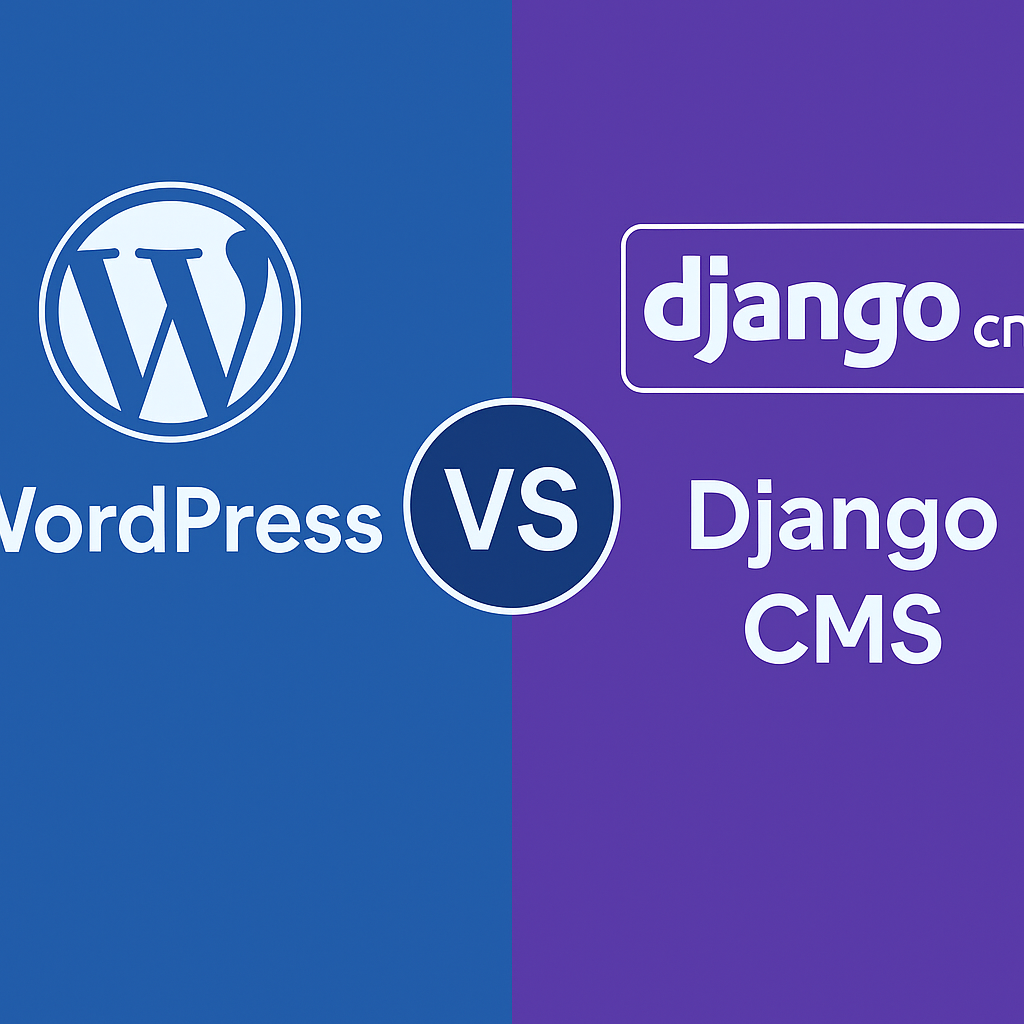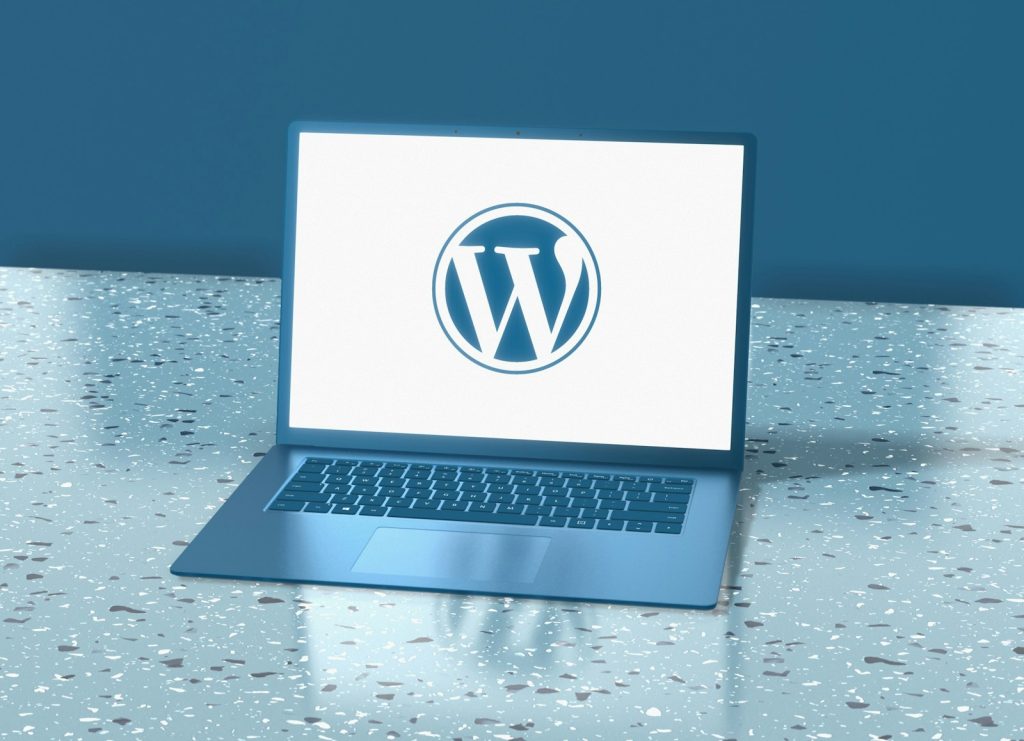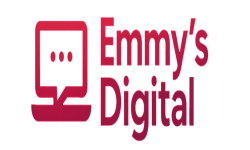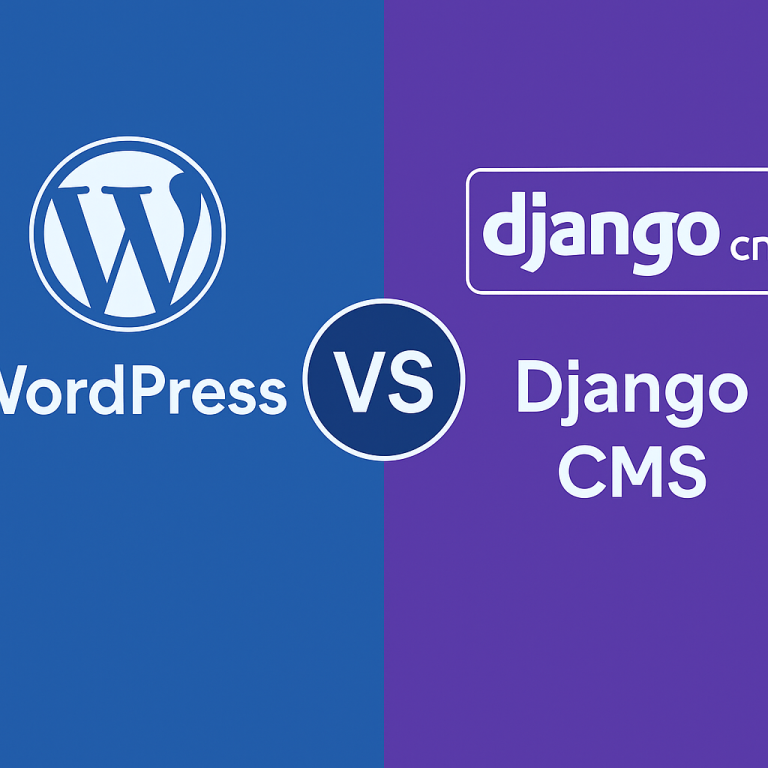
Choosing the right content management system (CMS) is one of the most important decisions when building a website. Two powerful options—WordPress and Django CMS—often come up in this conversation. But they serve very different audiences.
In this article, we’ll break down how each CMS performs across key areas like ease of use, customization, eCommerce, performance, and more. Whether you’re a beginner, business owner, or experienced developer, this guide will help you make the best choice for your project.
What Is WordPress?
WordPress is the world’s most popular CMS, powering over 40% of all websites. It’s open-source, beginner-friendly, and supported by a massive community. With thousands of themes and plugins, you can build anything from a blog to a full eCommerce store—without touching a single line of code.
Best For:
-
Bloggers & content creators
-
Small business websites
-
WooCommerce stores
-
Non-tech users
Key Benefits:
-
Easy setup with 1-click installers
-
Thousands of free themes and plugins
-
Great SEO & marketing support
-
Low cost of entry
-
Massive support community
What Is Django CMS?
Django CMS is a modern, developer-focused CMS built with Python and the Django web framework. It’s more customizable and flexible than WordPress but also more complex. Django CMS shines in large-scale or enterprise-level projects where performance, scalability, and full control over the back-end matter most.
Best For:
-
Developers & engineers
-
Large-scale web applications
-
Custom platforms or intranets
-
Organizations with technical teams
Key Benefits:
-
Built for performance and scalability
-
Full control over data and structure
-
Strong integration with Python tools
-
Secure and highly customizable
WordPress vs Django CMS: Feature Comparison
| Feature | WordPress | Django CMS |
|---|---|---|
| Ease of Use | Beginner-friendly | Developer-focused |
| Tech Stack | PHP, MySQL | Python, Django |
| Themes & Plugins | 60,000+ available | Limited, mostly custom-built |
| Community & Support | Huge global community | Smaller, developer-based support |
| Scalability | Good for most sites | Excellent for large-scale apps |
| Security | Strong (with plugins) | Very strong (built-in practices) |
| Learning Curve | Low | High |
| Ideal Audience | Bloggers, SMBs, marketers | Developers, tech startups, enterprise apps |
WordPress vs. Django CMS

WordPress is the world’s most popular CMS, used by over 40% of websites globally. It’s written in PHP, open-source, and designed to be beginner-friendly. With thousands of themes and plugins, it’s perfect for blogs, portfolios, and eCommerce sites.
Django CMS, on the other hand, is a developer-first platform built using Python and the Django web framework. It offers flexibility and is better suited for large-scale or custom web applications that need powerful backend logic.
Ease of Use: Which CMS is Easier to Learn?
WordPress: The Beginner-Friendly Choice
WordPress is designed for users with little to no technical expertise. Its intuitive dashboard allows anyone to create, edit, and manage content effortlessly.
- WordPress: Extremely easy for beginners. With one-click installs, drag-and-drop page builders, and a visual editor (Gutenberg), even non-tech users can build full websites.
-
No Coding Required: You can build a fully functional website using drag-and-drop page builders like Elementor or Divi.
-
Quick Setup: Most hosting providers offer one-click WordPress installations, making it possible to launch a site in minutes.
-
WYSIWYG Editor: The Gutenberg block editor lets users visually design pages without touching HTML or CSS.
-
Extensive Documentation: Thousands of tutorials, forums, and guides make learning WordPress simple.
Django CMS: A Developer-Centric Approach
Django CMS is built for developers who need fine-grained control over their website’s architecture.
- Django CMS: Has a steep learning curve. It requires knowledge of Python and Django. Ideal for developers, but not user-friendly for beginners
-
Python/Django Knowledge Required: Unlike WordPress, Django CMS requires familiarity with Python and the Django framework.
-
Structured Content Model: While powerful, its content management system has a steeper learning curve for non-developers.
-
Command-Line Setup: Installing Django CMS involves terminal commands and server configurations, unlike WordPress’s one-click install.
Winner: WordPress is the clear choice for beginners, while Django CMS is better suited for developers.
Customization Options: Making Your Website Your Own
WordPress: Endless Themes & Plugins
WordPress offers over 60,000 plugins and thousands of themes. You can customize everything from design to SEO settings—no code needed.
-
SEO optimization (Yoast SEO, Rank Math)
-
eCommerce functionality (WooCommerce)
-
Membership systems (MemberPress)
-
Contact forms (WPForms, Contact Form 7)
However, excessive plugins can slow down a site, and deep customization often requires PHP knowledge.
Django CMS: Complete Developer Freedom
Django CMS is flexible, but customization requires coding. You’ll need to build or modify components manually with Python and templates.
-
Tailored Applications – Developers can build custom modules from scratch.
-
Clean Codebase – Unlike WordPress, which can get bloated, Django CMS follows Python’s clean and maintainable coding principles.
-
API-First Approach – Easily integrates with third-party services and databases.
Winner: WordPress wins for quick, no-code customization, while Django CMS is superior for bespoke development.
Content Management: Keeping Your Content Organized
WordPress: Simple but Flexible
WordPress makes content creation easy. Use blocks, categories, tags, and media embedding to structure content visually.
-
User-friendly editor (Gutenberg) for easy content creation.
-
Categories & Tags help organize blog posts.
-
Custom Post Types (via plugins like Advanced Custom Fields) allow structured content.
However, managing complex relationships (e.g., multi-language sites) can be challenging without plugins.
Django CMS: Structured & Scalable
Django CMS also has powerful content control but leans toward structured data models and custom templates.
-
Built-in multi-language support without extra plugins.
-
Custom content types are easier to define.
-
Version control for content revisions.
Winner: Django CMS is better for large, structured websites, while WordPress is simpler for blogs and small business sites.
eCommerce: Selling Online
WordPress (WooCommerce)
WordPress + WooCommerce is one of the top eCommerce platforms today. You can sell physical/digital products, services, and memberships.
-
WooCommerce powers 28% of all online stores.
-
Easy setup with payment gateways, shipping, and tax options.
-
Thousands of extensions for subscriptions, bookings, and memberships.
Django CMS (Custom or Third-Party Solutions)
Django CMS can be used with packages like Saleor, but it’s not out-of-the-box ready for eCommerce and will require development time.
-
Requires custom development or integration with platforms like Saleor.
-
Better for highly customized marketplaces (e.g., large-scale B2B stores).
Winner: WordPress (WooCommerce) is best for most online stores, while Django CMS suits enterprise-level eCommerce.
Performance: Speed Matters
WordPress
WordPress sites can be fast with optimization, caching plugins (e.g., LiteSpeed, WP Rocket), and good hosting.
-
It can be slow if overloaded with plugins.
-
Caching plugins (WP Rocket, W3 Total Cache) help improve speed.
-
Good for small-to-medium traffic but may struggle with high-traffic spikes.
Django CMS
Django CMS is built for speed and scalability by default, especially under high load and complex operations.
-
Python-based, so it’s inherently faster for complex queries.
-
Better for high-traffic sites (e.g., news portals, SaaS platforms).
Winner: Django CMS is faster for large-scale applications.
Security: Keeping Your Website Safe
WordPress
WordPress is secure, but due to its popularity, it’s a bigger target. Using strong plugins, firewalls, and regular updates is critical.
-
Popular target for hackers due to its widespread use.
-
Requires regular updates and security plugins (Wordfence, Sucuri).
Django CMS
Django CMS follows strict Python security practices and has fewer public attack surfaces, making it naturally more secure.
-
Django has built-in security (CSRF protection, SQL injection prevention).
-
Less targeted due to its smaller user base.
Winner: Django CMS is more secure by default.
Community and Support
WordPress
WordPress has a vast global community, millions of developers, tutorials, forums, and support tools.
-
Huge community (forums, meetups, WordCamps).
-
Abundant tutorials for troubleshooting.
Django CMS
Django CMS has a smaller, developer-heavy community. Support is great, but not as beginner-friendly.
-
Developer-focused community (Stack Overflow, GitHub).
-
Fewer beginner-friendly resources.
Winner: WordPress has better support for non-developers.
Cost: Which CMS Is More Affordable?
WordPress
WordPress is free and open-source. You can run a website for as little as $2–$10/month using budget hosting.
-
Free (open-source), but costs add up for hosting, premium themes, and plugins.
-
Shared hosting starts at ~$2-10/month.
Get the best WordPress hosting at a good price using Cupisweb
Django CMS
Django CMS is also free, but deployment often requires a VPS, custom development, and DevOps knowledge, raising the cost.
-
Free, but requires developer expertise (higher labor costs).
-
Hosting (VPS/cloud) is more expensive (~$10+/month).
Winner: WordPress is cheaper for most users.
The Verdict: Choosing the Right CMS for Your Needs
✅ Choose WordPress if:
-
You’re a beginner or non-technical user.
-
You need a blog, business site, or online store.
-
You want a quick setup with plugins.
✅ Choose Django CMS if:
-
You’re a developer or have a technical team.
-
You need a highly customized, scalable web app.
-
Performance and security are top priorities.
| Use Case | Recommended CMS |
|---|---|
| Personal blog or portfolio | WordPress |
| Small business website | WordPress |
| eCommerce store | WordPress |
| Large-scale web app | Django CMS |
| Developer-heavy team project | Django CMS |
| Fast setup without coding | WordPress |
| Maximum customization (via code) | Django CMS |
Bottom line:
If you’re not a developer or need to launch a professional website fast, go with WordPress. If you’re building a custom app and have coding experience, Django CMS is your best friend.
FAQs About WordPress vs. Django CMS
Is WordPress or Django easier for beginners?
WordPress is significantly easier for beginners. It features a simple dashboard, one-click installs, and thousands of themes and plugins that make it easy to build and manage a site without writing code.
Is Django CMS a good content management system?
Yes, Django CMS is excellent for complex projects that require a high level of customization. However, for most general-purpose websites and blogs, WordPress offers a more practical, beginner-friendly solution.
Which is better for managing content: WordPress or Django CMS?
WordPress is built with content management in mind. Its block editor, media tools, and plugin ecosystem make organizing content simple. Django CMS is powerful, but best suited for developers and structured data-heavy content.
Do I need to know how to code to use WordPress or Django?
You can use WordPress without any coding experience. For heavy customizations, hiring a developer helps. Django, however, is developer-focused—you’ll need to know Python and web frameworks to get the most out of it.
Which CMS offers more customization?
WordPress offers wide customization through themes and plugins, even for non-coders. Django CMS allows deeper customization via coding, making it more flexible but less accessible to beginners.
Which platform is more secure?
Django CMS is built with security in mind and generally requires fewer third-party add-ons. WordPress can be highly secure, too, if you keep it updated and use reputable security plugins.
Is WordPress faster than Django CMS?
Out-of-the-box, Django CMS may have better performance for large-scale applications. WordPress can still be fast if optimized properly using caching, CDN, and lightweight themes.
Which CMS is more budget-friendly?
WordPress is typically cheaper to get started. You can run a full website on shared hosting with free themes and plugins. Django CMS may involve higher costs for hosting and developer setup.
Are there enough resources for Django CMS?
While Django CMS has decent documentation and an active dev community, it can’t compare to WordPress, which has a massive global support system, forums, YouTube tutorials, blogs, and agencies.
When should I choose WordPress over Django CMS?
Choose WordPress if you want to build blogs, small business sites, or content-rich platforms easily. Opt for Django CMS if your project needs a custom-built application, a scalable backend, and you or your team are comfortable coding.
Bonus Resources: Website Building & Content Management
For WordPress Users:
For Django CMS Developers:
Final Thoughts
WordPress is the best choice for most users due to its simplicity and flexibility. However, if you need a highly customized, scalable, and secure website—and have the technical skills—Django CMS is the superior option.
Which CMS are you leaning toward? Let us know in the comments. 🚀
Ready to Build?
Start with WordPress if you want simplicity and speed. You can grab affordable hosting with a 1-click WordPress install via Hostinger. It’s perfect for beginners and includes free SSL, domain, and email.
If you’re looking for budget-friendly hosting and a super user-friendly control panel, you should check out Cupisweb.

